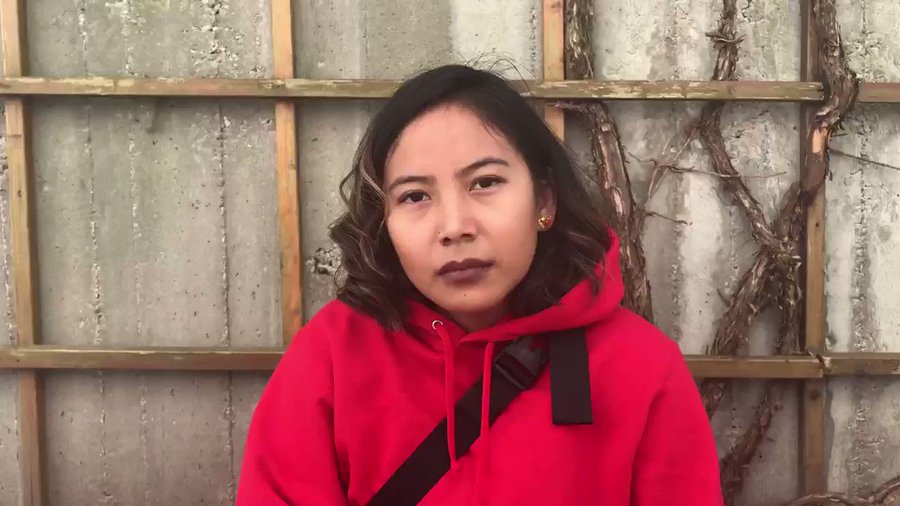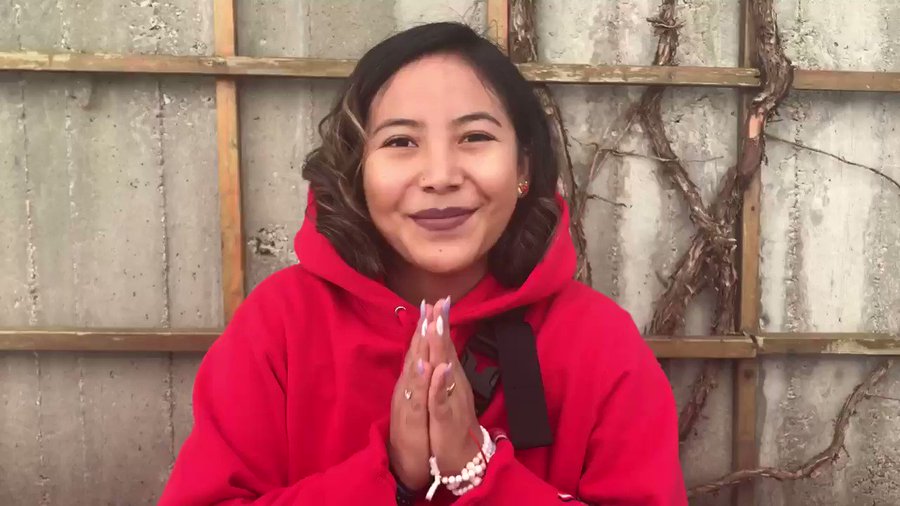VANCOUVER—When Rukiye Turdush took the stage at Ontario’s McMaster University in February, she had a “gut feeling” about an audience member who arrived early to set up his computer and phone.
But she continued with her talk on the Chinese state’s oppression and mass internment of the predominantly Muslim Uyghur people in Xinjiang.
Suddenly another man opened a back door of the lecture hall and shouted “La ji!” which means “garbage” in Mandarin, then quickly left. Still, Turdush continued.
During the question-and-answer period, when Turdush asked the young man she had noticed at the beginning of the lecture if he had any questions, he responded with an angry outburst. He told her she shouldn’t speak at the university and shouted “F--- you” as he stalked out of the lecture hall.
Turdush, who is a Canadian citizen of Uyghur descent, later learned that someone had shared a video recording of her talk on a WeChat group for the university’s Chinese Students and Scholars Association (CSSA).
The leaked screenshots that a concerned student gave her also showed members writing that they had contacted the Chinese embassy about the event. The postings said the embassy told them to find out whether university officials attended the talk and whether Chinese nationals were involved in organizing the talk.
The Chinese consulate in Ottawa denied it had anything to do with the actions, but said in a statement that they “strongly support the just and patriotic actions of Chinese students.”
After the Washington Post and Canadian media outlets reported on the case, the McMaster student union voted to strip the school’s CSSA of its official club status.
But Turdush recently told Star Vancouver that no government or university official has contacted her to verify possible collusion between the students and Chinese government representatives.
“I thought that if I spoke with media, the government would take actions to deal with the Chinese government extending their influence to suppress freedom of speech here in Canada,” she said.
“This is United Front work. I’ve called for an investigation ... but I’ve heard nothing.”
Rukiye Turdush held a talk at McMaster University on the Chinese state's oppression and mass internment of the predominantly Muslim Uyghur people in Xinjiang. One audience member filmed it and she later learned that someone had shared a video recording of her talk on a WeChat group for the university's Chinese Students and Scholars Association. The leaked screenshots that a concerned student gave her also showed members writing that they had contacted the Chinese embassy about the event.
Last month, Global News reported that Richard Lee, an MLA in B.C. at the time, was detained by Chinese authorities in Shanghai in 2015; the officials searched his Canadian government-issued cellphone. Lee received no assistance from the federal government, he alleged.
The Chinese Communist Party’s shadowy United Front Work Department sounds like the stuff of spy novels, but the UFWD is an official agency that is lavishly well-resourced with agents numbering in at least the tens of thousands. In recent years, Chinese President Xi Jinping presided over an expansion of the department that included adding 40,000 staff, according to a research paper from Gerry Groot, an instructor at Australia’s University of Adelaide.
The United Front is “clearly active in Canada” as well as in many places around the world, but many have never heard of it and the lack of a co-ordinated government response “leaves Canadians vulnerable,” said Human Rights Watch China director Sophie Richardson, who also told Star Vancouver she has spoken with Canadian officials about these concerns.
Last week, Canadian opposition parties banded together to force the creation of a special committee on Canada-China relations tasked with investigating national security issues, diplomatic ties, economic issues and consular affairs.
How long has the United Front been around?
Modern-day United Front activities have roots in imperial China, when emperors started to see the overseas Chinese diaspora as potential assets, and made moves to co-opt foreigners, according to a book by New Zealand academic Anne Marie-Brady.
Chairman Mao Zedong introduced his idea of Leninist “united front work” in a Party journal in 1939, during the 22-year civil war between the Nationalists and the Chinese Communist Party. Mao wrote: “The Party is the heroic warrior wielding the two magic weapons, the united front and the armed struggle, to storm and shatter the enemy’s positions.” He meant that the CCP should rally as many allies as possible in conjunction to waging military campaigns.
When the Communists won the civil war and established the People’s Republic of China in 1949, much of the population remained unconvinced of socialism’s benefits, with many even fleeing the country in fear. And so the united front work continued. The CCP sent emissaries around the country to meet with local warlords, religious leaders and major ethnic minority groups in order to bolster the party’s legitimacy.
What is the United Front?
United Front officials are responsible for managing relationships with key individuals and non-Communist entities both inside and outside mainland China. The UFWD collaborates closely with propaganda officials and the Ministry of State Security police intelligence agency, according to United Front researchers.
In 1979, under Chinese leader Deng Xiaoping’s ambitious leadership, the United Front became an official department of the Chinese Communist Party. Its task was to collect information from sources around the world and advance Beijing’s agenda everywhere.
What has the United Front done in Canada?
Aside from the story of Turdush’s harassment, earlier this year online trolls went after a woman of Tibetan descent elected as a student union president at the University of Toronto Scarborough, including starting a petition signed by 11,000 people demanding she step down.
Chemi Lhamo, the president of University of Toronto's Scarborough Campus Student's Union, who is of Tibetan descent, told The Star she was being harassed even before she was elected, with many of the attacks accusing her of being a Tibetan separatist. (Chris Young / The Canadian Press)
- Chemi Lhamo, a 22-year-old neuroscience and psychology major, told The Star she was being harassed even before she was elected, with many of the attacks accusing her of being a Tibetan separatist.
“You’re going to get shot and the bullets are going to be made in China,” one user wrote, while others who taunted her claimed to be her classmates.
Lhamo, a Canadian citizen, said she’s a human rights advocate for all and believes Tibetan independence is up to Tibetans living in China, but often, the attacks against her have had Tibetan separatism accusations rolled into them. The Chinese consulate in Toronto denied having anything to do with the targeting of Lhamo.
But the United Front has also courted Canadian politicians. In 2017, the Globe and Mail reported on a number of Canadian senators and MPs who accepted sponsored travel to China and said two of them, senator Victor Oh and then-MP Geng Tan met with arms of the UFWD while there.
What else has the United Front done abroad?
A report for the U.S.-China Economic and Security Review Commission by policy analyst Alexander Bowe in 2018 raises concerns about Chinese agents approaching students to infiltrate Chinese dissident groups on University campuses in the U.S. and Australia.
The paper points to one organization directly under the United Front, called the China Council for the Promotion of Peaceful Reunification, as having 33 chapters in the U.S. and “at least” 200 chapters in 90 countries. Canada has chapters of the organization in Vancouver, Toronto, Montreal and Ottawa.
Confucius Institutes are one of the efforts highlighted by the paper as a major tool for the UFWD. The institutes are billed as an effort to teach Chinese language, culture and history, but also serve to push the Chinese government’s “preferred” narratives on campuses around the world, Bowe wrote.
“The Confucius Institute program has long-standing and formal ties to the UFWD, as Liu Yandong — a former Chinese vice-premier and Politburo member — was the head of the UFWD when she launched the program in 2004,” he wrote.
Chemi Lhamo, a Tibetan youth leader and Canadian citizen, who was the target of death threats after she ran for student union president in Toronto, had this to say to racialized youth after #Trudeaubrownface photo: thestar.com/news/gta/2019/…
Have any countries worked to counter this effort?Even after threats including someone saying they had a “bullet from China” for her because of her Tibetan values, Chemi is using her role as Univ. of Toronto Scarborough president to foster a sense of global community. Not seeing international students as revenue for schools.
In Australia, the federal government brought in legislation meant to counter attempts by foreign governments to influence Australian politicians and civil servants.
The Espionage and Foreign Interference Act was brought into the country’s Parliament in 2018. It strengthens existing espionage laws and introduces new offences for foreign interference, according to a summary of the bill by Australia’s Department of Defence.
Prison sentences are now possible for “actions that would previously been considered security incidents or breaches of administrative policy,” reads the summary. “Knowingly” funding or being funded by a foreign intelligence agency is among the offences with a 15-year maximum sentence.
Australian academic Clive Hamilton has sounded the alarm about China’s influence in the country. In a panel hosted by the Macdonald-Laurier Institute a year ago in Ottawa, Hamilton said Canada is equally a target for the UFWD.
He said the legislation essentially makes covert activity on behalf of a foreign power meant to influence Australian government illegal.
“The foreign interference law is designed to counter China’s specific forms of foreign interference, that is, covert, coercive and corrupt forms of influence,” Hamilton told Star Vancouver in an email. “Some UFWD activities certainly come within its scope.”
Canadians are more exposed to “influence” operations than ever before, according to an internal assessment from the country’s electronic spy agency.
A 2018 memo from the Communications Security Establishment (CSE) warned the rise of “web technology” like social media, along with Canadians’ changing habits for consuming media, make the population much more likely to encounter efforts by foreign powers to shape domestic political opinion.
Parliament’s new national security review committee has completed a review of foreign espionage activities in Canada and submitted it to Prime Minister Justin Trudeau. The classified report detailing their findings is expected to be released early in 2020, once the House of Commons resumes sitting.
With files from Alex Boutilier







No comments:
Post a Comment